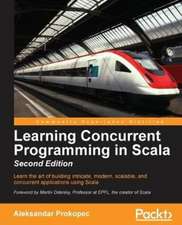FPGA Task Arrangement with Genetic Algorithms
Autor Bernd Scheuermannen Limba Engleză Paperback – 11 apr 2000
Preț: 651.82 lei
Preț vechi: 814.77 lei
-20% Nou
Puncte Express: 978
Preț estimativ în valută:
124.74€ • 135.45$ • 104.78£
124.74€ • 135.45$ • 104.78£
Carte disponibilă
Livrare economică 02-16 aprilie
Preluare comenzi: 021 569.72.76
Specificații
ISBN-13: 9783838622996
ISBN-10: 3838622995
Pagini: 148
Dimensiuni: 148 x 210 x 11 mm
Greutate: 0.2 kg
Editura: diplom.de
ISBN-10: 3838622995
Pagini: 148
Dimensiuni: 148 x 210 x 11 mm
Greutate: 0.2 kg
Editura: diplom.de












![Render[in] - Einfaches Rendering mit SketchUp](https://i0.books-express.ro/bt/9783981950601/render-in-einfaches-rendering-mit-sketchup.jpg)